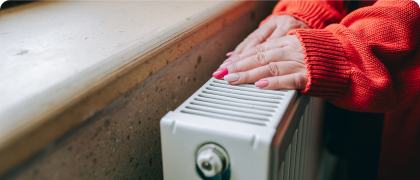Published: 27 October 2021
Around 22% of the UK’s carbon emissions come from our homes – so it’s important to know what changes we can make to help combat climate change[1].
Understand the A-G of EPCs
An Energy Performance Certificate (EPC) gives a clear view of your home’s energy efficiency, with an A rating being the most energy efficient and G being the least. You’ll need an EPC if you intend to sell or lease your home. Also, better mortgage deals are now widely available for those with a rating between A-C.
Our tip: improve your EPC – by taking some of the steps outlined in this guide you could improve your chances of a better EPC rating, save money, and make your home more attractive to potential buyers in the future. Also, by getting an EPC evaluation carried out, you’ll be provided with a list of recommendations on how to improve your energy efficiency.
Be power savvy
It’s reported that households spend between 9% and 16% of their annual electric bills on standby energy[2], adding unnecessary running costs to our homes and using energy we simply don’t need to use.
Our tip: switch off before you switch off – before you go to bed, if the TV and smart speaker are on standby, turn them off. And don’t charge your phone or tablet overnight. Being power savvy reduces the energy you use and could cut costs too.
Have a lightbulb moment
Around 10-20% of household energy bills go on lighting, but are the lightbulbs in your home as energy efficient and long-lasting as they could be?
Our tip: choose LED - using approximately 90% less energy than a halogen or incandescent bulb, LED lightbulbs help the environment, and they can even be recycled. They also last up to 20 times longer because unlike halogen bulbs, they don’t generate heat.
Be energy educated
A normal home emits an average of 2.7 tonnes of CO2 a year just from heating[3]. Add that up across all the houses in the UK and it’s a lot of greenhouse gas. Emerging heating technologies provide us with some fantastic options for more energy efficient heating. For example, smart meters provide a picture of the impact heating your home has on your energy bills, while smart thermostats now allow you to control heating from a mobile app - meaning you only have your heating on when you need it.
Our tip: go electric – if your gas boiler is on its way out, why not choose an electric one? Most electric boilers have an eco-friendly energy efficiency rating of 99%, and they don’t burn any fossil fuels. You can also think about choosing an energy supplier that only uses renewable sources next time you switch. Alternatively, you could swap your boiler for a heat pump and receive money from the UK Government[4].
Use the sun to go green
Even in the UK’s damp climate, you can use the power of sunlight to generate your own electricity and dramatically cut your energy bills.
Our top tip: suss out solar - by fitting solar panels on your roof, you can convert the sun’s energy into renewable electricity, and any electricity you don’t use could be sold back to an energy supplier. Use the Energy Saving Trust’s Solar Calculator[5] to weigh up the cost-effectiveness of installing the panels and always check with your local authority before getting solar panels fitted.
Insulation, insulation, insulation
The UK has a large amount of older housing stock and that’s not good news when it comes to heat retention and energy consumption. Around 25% of the heat lost in a house is through the roof with 35% lost through the walls and another 10% lost through windows. There’s also draughty doors and windows to think about, too[6].
Our tip: by fitting fiberglass insulation in the loft, you could see a potential reduction in heat loss of 75% in that area of the building[7]. And fitting double glazed windows is another way to make sure your home is as insulated as possible.
Tell us how you’re living greener
You can find out more news about climate change together with the latest government guidance, and regulation information at www.gov.uk/environment/climate-change-energy.
And we’d love to hear the difference our tips make for you as you and your family try to live greener. Get in touch on our Facebook and Twitter channels and share what’s working for you.
This article is intended for information purposes only and is accurate at the time of publication. It’s always advisable to verify any information you take before relying on it.
[1] https://energysavingtrust.org.uk/energy-at-home/
[2] https://www.wearedonation.com/en-gb/do-actions/unplugged/#why
[3] https://citu.co.uk/citu-live/what-is-the-carbon-footprint-of-a-house
[4] https://www.gov.uk/domestic-renewable-heat-incentive
[5] https://energysavingtrust.org.uk/advice/solar-panels/
[6] https://energysavingtrust.org.uk/advice/draught-proofing/
[7] https://energysavingtrust.org.uk/advice/roof-and-loft-insulation/


